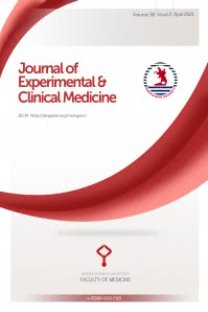The effects of low pH on nitric oxide (NO) synthesis from human monocyte derived macrophages
Nitrik oksit, Hidrojen-iyon konsantrasyonu, Makrofajlar
İnsan monosit-derive makrofajların nitrik oksit (NO) sentezine düşük pH'ın etkileri
Nitric Oxide, Hydrogen-Ion Concentration, Macrophages,
___
1. Kuby J. "Kuby J (ed) Cells and organs of the immune system. Immunology, third edition. New York: W.H. Freeman and Company, 1997; 47-82. 2. Bellocq A, Suberville S, Philipe C et al. Low environmental pH Is responsible for the induction of nitric-oxide synthase in macrophages-evidence for involvement of nuclear factor-KB activation. J Biol Chem 1998; 273; 5086-5092. 3. Moncada S, Higgs A. The L-arginine-nitric oxide pathway. The New Eng J Med 1993; 329; 2002-2010. 4. Coligan JE, Kruisbeek AM, Morgulies DH, Schevach EM, Strober: In Current Protocols in Immunology, W. John Wiley and Sons Inc, USA, 1994. 5. Chang HR, Vladoianu IR, Pechere JC. Effects of ampicillin, ceftriaxone, pefloxacin, and trimethoprim-sulphamethoxazole on Salmonella typhi within human monocyte-derived macrophages. J Antimicrob Chemother 1990; 26: 689-694. 6. Slzemore DR, Elsinghorst EA, Eck LC et al. Interaction of Salmonella typhi strains with cultured human monocyte-derived macrophages. Infect Immun 1997; 65; 309-312.. 7. Balland O, Pinto-Alphandry H, Viron A et al. Intracellular distribution of ampicillin in murine macrophages infected with Salmonella typhimurium and treated with (3H) ampicillin-loaded nanoparticles. J Antimicrob Chemother 1996; 37: 105-115. 8. Buchmeier NA, Heffron F. Intracellular survival of wild-type Salmonella typhimurium and macrophage-sensitive mutants in diverse populations-of macrophages. Infec Immun 1989; 57: 1-7. 9. Igietseme JU, Perry LL, Ananaba GA et al. Chlamydial infection in inducible nitric oxide synthase knockout mice. Infect Immun 1998; 66; 1282-1286. 10. Baud L, Bellocq A, Philippe C et al. Low environmental pH participates In the induction of NO synthase type II in macrophages. Bull Acad Natle Med 1997; 181: 247-260. 11. Pedoto A, Caruso JE, Nandi J et al. Acidosis stimulates nitric oxide production and lung damage rats. Am J Respir Crit Care Med 1999: 59: 397-402.- ISSN: 1300-2996
- Yayın Aralığı: Yılda 4 Sayı
- Başlangıç: 2018
Üriner tüberkülozda intravenöz ürografi bulguları ve tanıya katkısı
Murat GÜLER, Murat DANACI, Ümit BELET, Çetin ÇELENK
Valproic acid-induced neutropenia
Investigation of DNA damage in epileptic women treated with phenobarbital
Metin DENLİ, Ruşen DÜNDARÖZ, Cemal AKAY, Tayfun GÜNGÖR, Halil İbrahim AYDIN, Volkan BALTACI
Fatma AYDIN, Tayyar CANTÜRK, Nilgün ŞENTÜRK, Ahmet Yaşar TURANLI
C. Türkay YALIN, Burhan YAZICI, Levent YILDIZ, Necati ÖZEN, İlkay Koray BAYRAK
The effects of low pH on nitric oxide (NO) synthesis from human monocyte derived macrophages
AHMET YILMAZ ÇOBAN, BORA EKİNCİ, ASUMAN BİRİNCİ, Belma DURUPINAR, Murat ERTÜRK
Gülendam BOZDAYI, Ayşe KALKANCI, Aydan BİRİ, Semra KUŞTİMUR
Beyin apselerinin cerrahi tedavisinde intraoperatif ultrasonografi kullanılması
Cengiz ÇOKLUK, Alpaslan ŞENEL, Ömer İYİGÜN, Mustafa ARAS, ARİF ÖNDER, Cemil RAKUNT, Fahrettin ÇELİK
